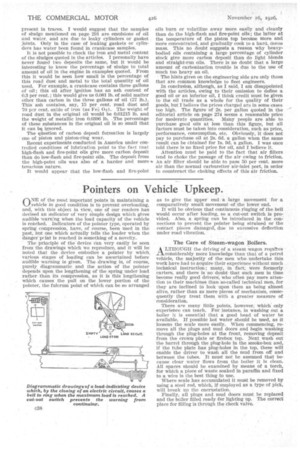Pointers on Vehicle Upkeep.
Page 60

If you've noticed an error in this article please click here to report it so we can fix it.
.O NE of the most important points in maintaining a „vehicle in good condition is to prevent overloading, and, with this object in view, one of our readers hag• devised an indicator of very simple design which gives audible warn'ng when the load capacity of the vehicle is reached. Indicators of the pointer type, operated by spring compression, have, of course, been used in the past, but one which actually tells the loader when the danger peint is reached is something of a novelty.
The principle of the device can very easily be seen from the drawings which we reproduce, and it will be noted that the device embodies a pointer by which. various stages of loading can be ascertained before audible warning is given. The -drawing is, of course, purely diagrammatic and the action of the pointer depends upon the lengthening of the spring under load rather than its compression, as it is this lengthening which causes the pull on the lower portion of the pointer, the fulcrum point of which can be so arranged as to give the upper end a large movement for a comparatively small movement of the lower end.
It will be obvious that continuous, ringing of the bell would occur after loading, so a cut-out switch is provided. Also, a spring can be introduced in the connections to prevent the pointer being strained or the contact pieces damaged, due to excessive deflection under road vibration.
. The Care of Steam-wagon Boilers.
A LTEfOUGH the driving of a steam wagon requites 11considerably more knowledge than that of a petrol vehicle, the majority of the• men who •undertake this work have had to acquire their experience without much 'technical instruction ; many, in fact; were formerly carters; and there is no doubt that such men in time become really good drivers', who often pay more attention to their machines than. so-called technical men, for they are inclined to look upon them as being almost alive, rather than as mere pieces of mechanism, consequently they treat them with a greater measure of consideration.
There are many little points, however, which only experience can teach. For instance, in washing out a boiler it is essential that a good head of water be available. If possible hot water should be used, as it loosens the scale more easily. When commencing, remove all the plugs and mud doors and begin washing through the plug-holes at the front, removing deposit from the crown; plate or firebox top. Next wash out the barrel through the plug-hole in the smoke-box and, if the tube plate has plug-holes in the top, these will enable the driver to wash all the mud from off and between the tubes. It must not be assumed that because clear water flows from the boiler it is dean. All spaces should be examined by means of a torch, for which a piece of waste soaked in paraffin and fixed to a wire is the best thing to use.
Where scale has accumulated it must be removed by using a steel rod, which, if employed as a type of pick, will break up the encrustation.
Finally, all plugs and mud doors must be replaced and the boiler filled ready for lighting up. The correct place for filling is through the check valve.












































































































